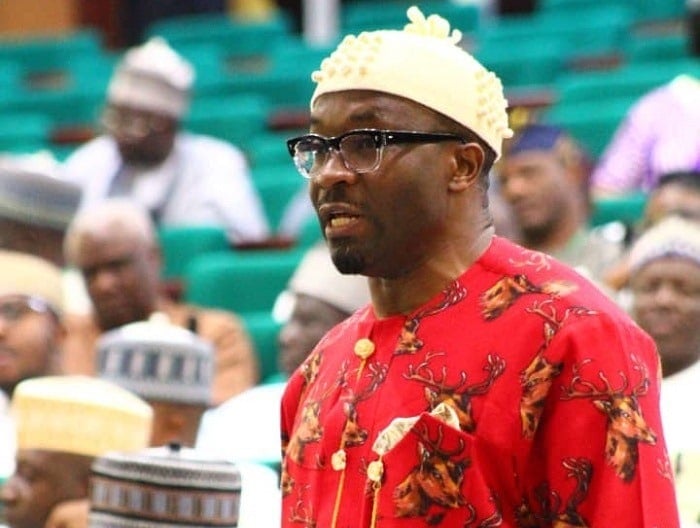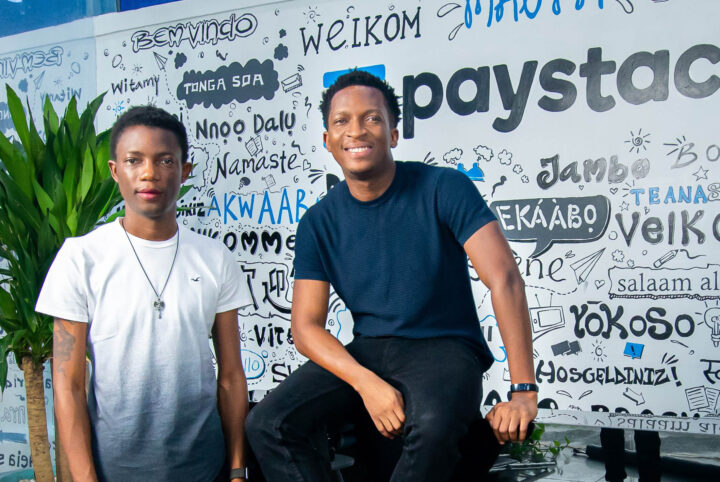Mohammed shows a piece of vibrant fabric used in Nigeria to make clothing.
By Christina Powell and Christine Tiff Cool
Twelve years of brutal conflict in north-east Nigeria have forced millions of women, children and men to flee their homes and livelihoods to stay alive.
Fleeing in the dark of night often means there is little time to grab anything but the essentials. Most people arrive in camps with almost nothing but the clothes they are wearing.
But surprisingly, the conflict has not stopped those displaced people from being hopeful of a brighter future and rebuilding their lives.
The following are portraits of resilience, and a peek into the lives of some of the displaced people who dream of a new future. Alhaji, Abubakar, Mohammed and Sadiq are fuelled by a hope that is not constrained by their circumstances.
Advertisement
A growing resolve
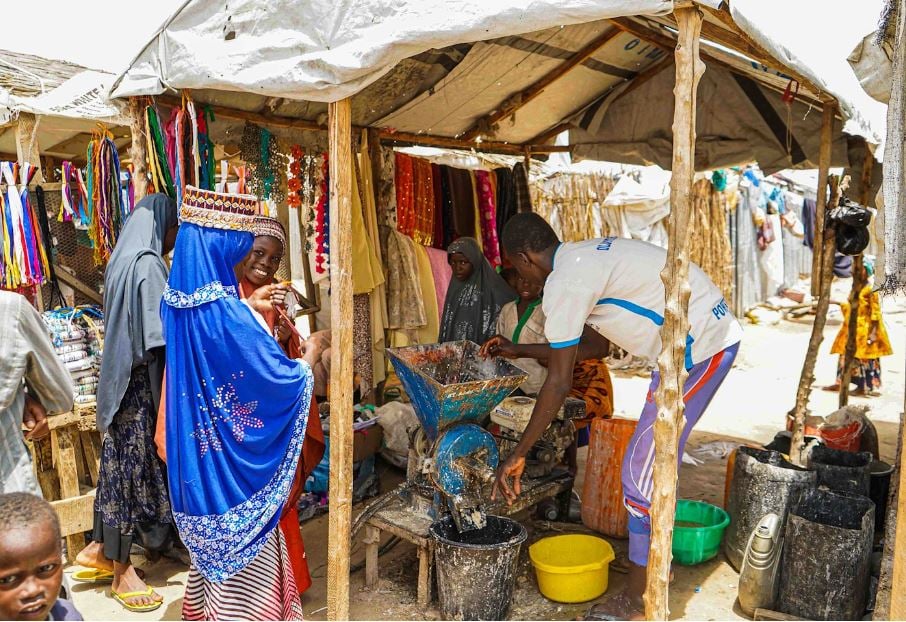
Alhaji Bukar was 19 when he arrived in Maiduguri six years ago with nothing. He fled his home in Baga, north-east Nigeria, seeking safety from the militant group Boko Haram, and walked nearly 200 km (124 miles) to Maiduguri with his family. They walked in extreme heat and weather conditions, with little food and water.
When they finally arrived in Maiduguri, they found shelter at Teacher’s Village Camp, an IDP camp supported and managed by the International Organization for Migration (IOM) and the State Emergency Management Agency (SEMA). Bukar, popularly called Alhaji, described it as a time when getting just N5 (less than 1 US cent) was too difficult for him.
But what he lacked in resources he made up for in resolve: he found work as an apprentice to a grinding machine operator to support his family. This involved grinding grains and pulses, such as corn, beans or wheat, for which he earned between 20 and N50 per order. He saved his small earnings, which go a long way in north-east Nigeria.
Advertisement
Eventually, with his savings and support from his parents, Alhaji bought his own grinding machine. Each time he powers it up to fulfill orders, he has a huge smile.
Visitors come from around the Teacher’s Village IDP camp to take advantage of Alhaji’s services, from grinding food items to selling sewing materials.
After losing his home and the life he knew and enjoyed before the conflict, he now has a source of income to help provide for his wife and child.
“I am grateful to God that today I have something of my own, that I can help myself and even my family,” he said.
Advertisement
Alhaji aims to expand his small business and is already selling sewing materials, such as thread and zippers.
Alhaji is one of the more than 2 million displaced people in north-east Nigeria, where conflict has led to 8.7 million people needing some form of humanitarian assistance across Borno, Adamawa and Yobe States. The displaced people — also known as internally displaced persons (IDPs) — live in camps or host communities and struggle to survive.
“We have to get up on our feet and fight for ourselves to earn our own income,” said Alhaji.
A bustling marketplace fuelled by hope
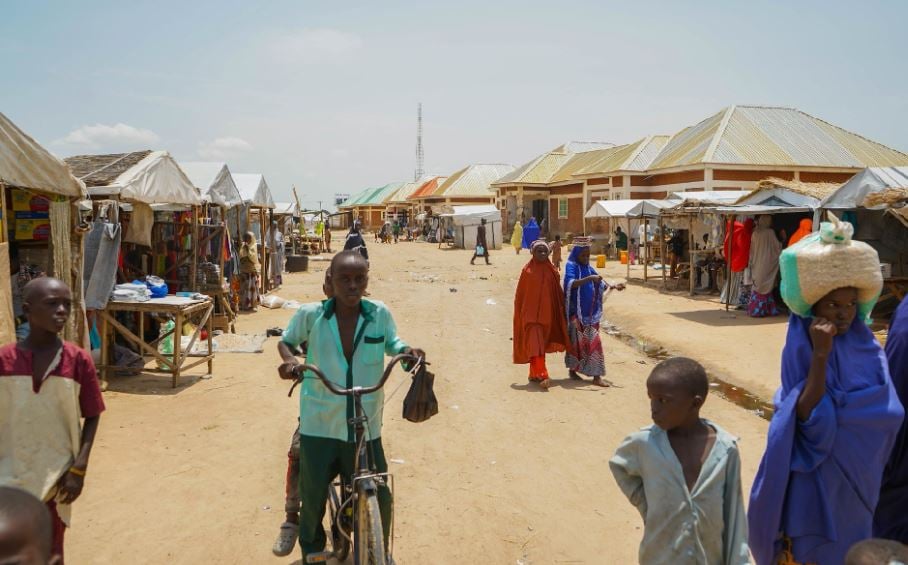
Alhaji’s story is one of many about building livelihoods within the camps. There are many people like Alhaji in the bustling marketplace in Teacher’s Village Camp.
Advertisement
Across from Alhaji’s stall is a makeshift shelter with two young tailors, feverishly working on their sewing machines while surrounded by vibrant fabrics and beautiful designs. Abubakar Shabui, 20, and Mohammed Rabeu, 22, are brothers from Baga and the camp’s local designers.
In Nigeria, women and men alike love colourful ensembles made from Ankara, a particular fabric with Africa-inspired designs. The brothers make exquisite creations with the fabric for the camp’s residents.
Advertisement
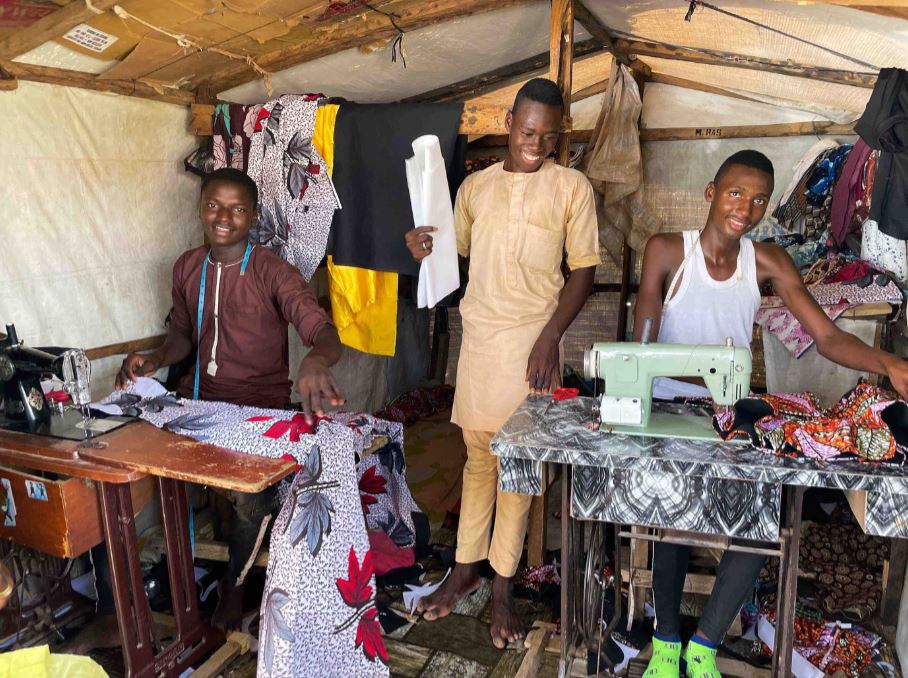
Attacks by non-State armed groups forced the brothers to flee their home with their family in 2019. They arrived at Teacher’s Village Camp with few possessions, but Abubakar and Mohammed had skills they were ready to use.
Before the conflict, the young men had trained to become tailors at a great expense: 50,000 naira ($121) a year. But it proved to be a good investment.
Advertisement
“I am grateful that the money we spent wasn’t a waste,” says Mohammed. “We are investing it now and getting a source of income for the family.”
He adds that they hope to grow their business and acquire a bigger shop.
Advertisement
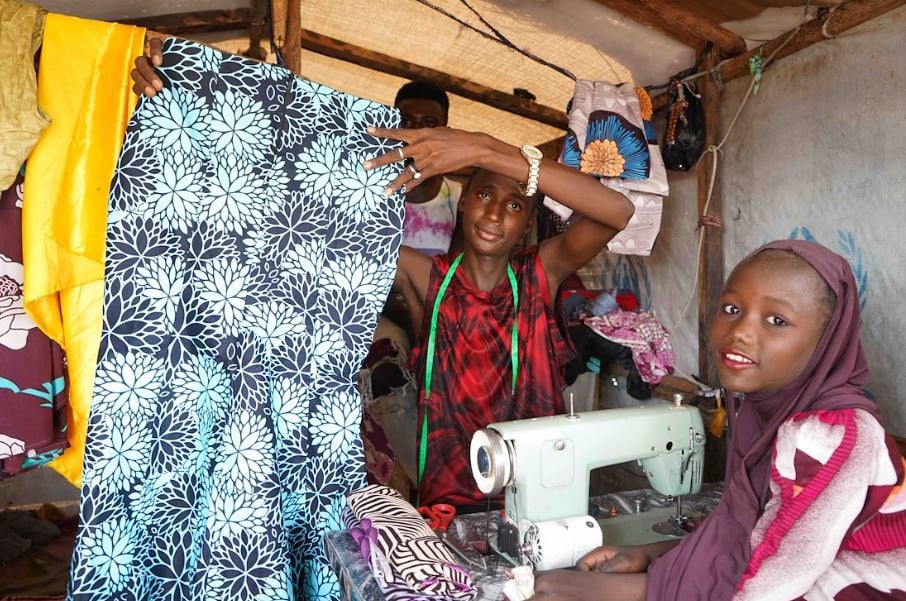
The brothers wish to return to Baga someday, when peace and security return to their homeland. But for now, they work day in, day out to literally bring colour and light to the camp. As women, children and men wear their designs proudly, Abubakar and Mohammed beam with pride and can say:
“We made that; we created that.”
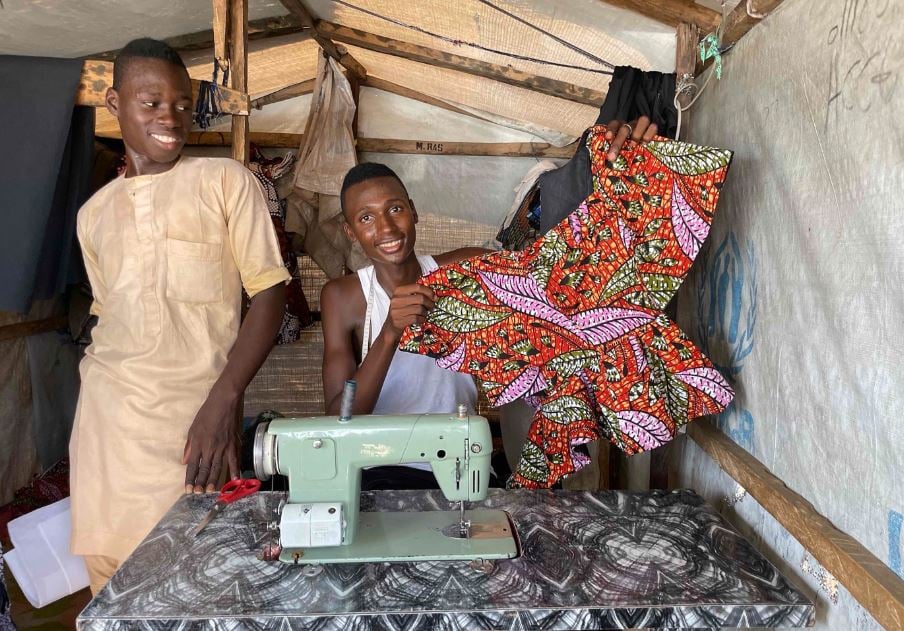
A few doors away from Abubakar and Mohammed, Nura Sadiq, 28, sells food, drinking water and other staples needed by the community. Like many others in the camp, Sadiq was displaced from Baga. He fled to Maiduguri three years ago with his wife, three children and only 10,000 naira ($24) to his name.
With perseverance and hard work, Sadiq built the shop he owns today. With his own start-up funds, he first bought and sold some charcoal. He then reinvested the profit in other items to sell.
Over time, he began offering clean and chilled drinking water in sachets, almost like bottled water but without the bottle. He used his income to procure and fix a used refrigerator for his business. Sadiq is now able to rent a shop, filled with the groceries that service the camp residents.
“I feel joy and satisfaction because now, whenever someone in the family needs anything, they can call on me and I can help them,” he says.
His children are excited about his work and help him after school.
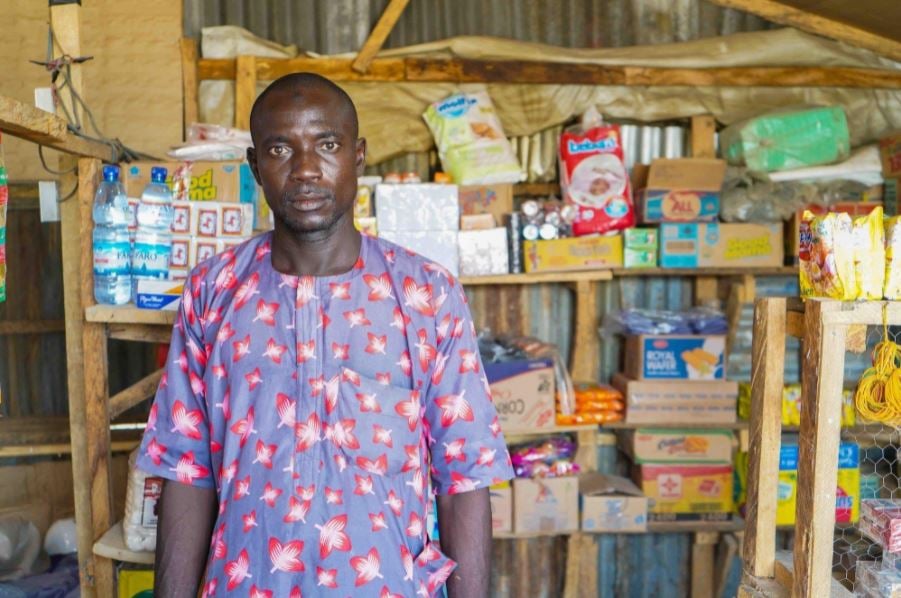
In addition to supporting his family, Sadiq provides employment opportunities to his fellow IDPs. He sells drinking water at wholesale price to young IDPs, who then sell it to consumers at a minor profit. In his own way, Sadiq, with his business acumen, is “franchising”.
“I have big dreams,” he explains.
“Before the conflict, I was doing this type of work back in Baga with my father. If the business keeps progressing, I hope to keep expanding and growing so that I can buy some land and build my home.”
Despite the burdens borne by Alhaji, Abubakar, Mohammed and Sadiq, their resilience provides hope to others like them in the camps who wish to rewrite their stories, and with courage reshape their tomorrows.
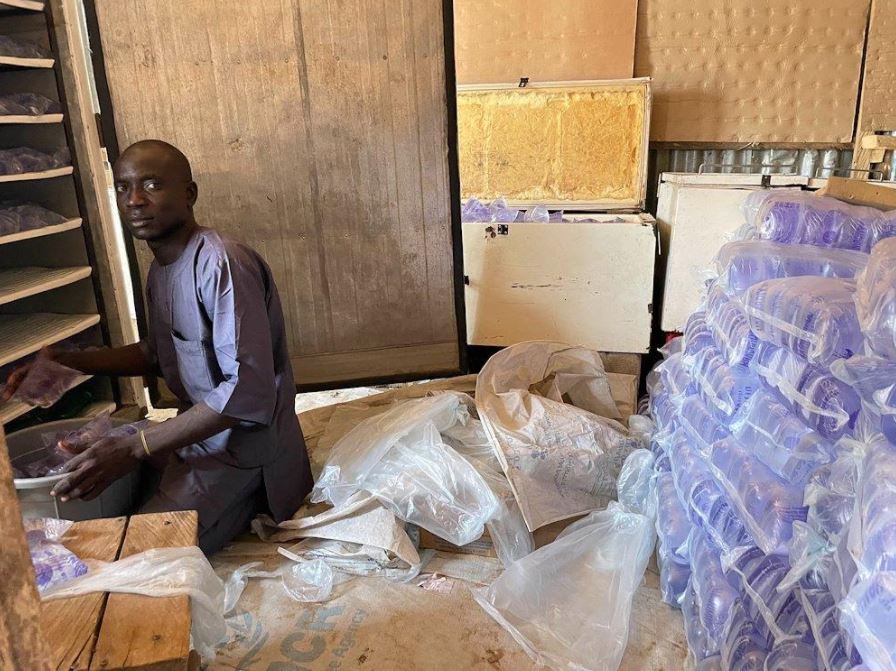
The UN and humanitarian partners are working to support livelihoods and other critical needs in the 2021 Humanitarian Response Plan for Nigeria. However, it is currently only 43 per cent funded. The Early Recovery Sector, which provides critical livelihoods support, is funded even less, at only 15 per cent.
Together we can help those who are working to help themselves and their communities. And we need to take action now.
Christina Powell and Christine Cool work with the United Nations Office for the Coordination of Humanitarian Affairs Nigeria
Add a comment
